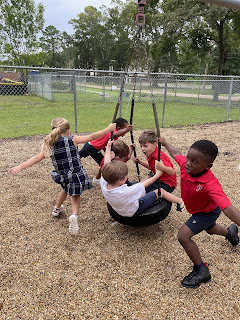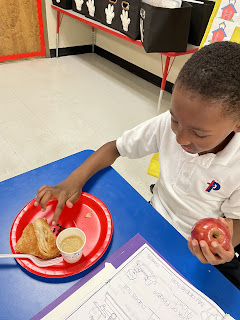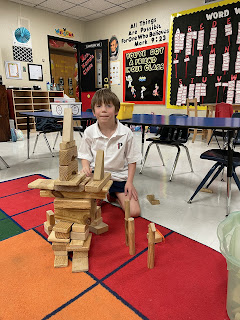 Hooray! Our hypothesis was correct.
Hooray! Our hypothesis was correct.Friday, September 9, 2022
Taste and See
 Hooray! Our hypothesis was correct.
Hooray! Our hypothesis was correct.Friday, September 2, 2022
Finding the Right Amount of Tension
 |
| We used OSMO to work on Number Sense. |
 |
| OSMO is a fun way to practice skills in math, phonics, science, and social studies. |

 |
| We worked hard on phonics and handwriting. |
 |
| We played "I Have, Who Has." |
 |
| This game helps us learn Sight Words. |
Helping students achieve their potential is a lot like tuning a guitar.
To deliver the desired notes, the guitar strings need the right amount of tension. If the strings are too slack, the notes are flat. But if the strings are wound too tightly, they produce a sharp sound. If tightened too much, they may even break.
The same is
true for the classroom. God created children with beautiful
potential. But if discipline is too lax, and if the students are given too much slack, that beautiful potential will never
become reality.
On the other hand, if there’s too much tension, if the
atmosphere in the class is too sharp, the results won’t be pretty.
The same is true with academics. In order to learn new things, students need to struggle a bit. A certain amount of tension is necessary. If the work is too easy, chances are the students aren't learning anything new---just reviewing what they already know. But if the work’s too hard, the students become frustrated.
As a teacher I’m
constantly trying to provide the right amount of tension. I push the students
to accept new challenges but to recognize when they’ve given all they can.
I try to make learning fun by adding games and varying activities. But at the same time, I remind the kids that sometimes we have to do things we don't particularly enjoy. Yet if we put in some hard work in the beginning, reading, writing, addition, and subtraction will eventually become second nature.
And when we find the right amount of tension, we hear the beautiful sound of children who are excited to learn.Sunday, August 28, 2022
Learning to Work and Play Together
 |
| We're learning to help one another...find the page, read the word, understand the directions. |
 |
| We're learning to learn in a group setting...where we take turns talking, refrain from interrupting, and refrain from distracting our classmates. |
 |
| We're learning to play together, to share, to listen to our friends' ideas, to collaborate. |
 |
| We're learning to be considerate of our friends... |
 |
| ...and to take turns. |
 |
| We're learning to work together in pairs. |
 |
| We're learning to work together in groups. |
The EC teachers' professional reading this summer was a book entitled The Importance of Being Little by early childhood expert Erika Christakis. In her chapter "Played Out," Christakis discusses how adults can help children navigate the inevitable conflicts that arise as children are learning to play together. She has much wisdom to offer on the subject, so I thought I'd share some of her advice.
- Practice gentle deflection. When a child reports a negative incident on the playground, clarify that it's not dangerous or destructive, and then move on. ..say, "That sounds annoying, but let's see what' in your backpack."
- If a child reports being called mean words, empower her in a relaxed tone: "But we know you're not a baby! That sounds like silly talk to me."
- Redirect a child who makes sweeping generalities. ("He's always taking my toys away.")…Even little kids can have "frenemies" who grate on their nerves yet offer something worthwhile...rich, extended play serves the dual function of revealing these human challenges and teaching children how to cope with them.
- Remind our children that everyone has struggles to work on when they play. Some kids are shy. Some have trouble controlling their bodies. Some people are good at rules, but aren't very friendly....
- Avoid using the word "bully to describe one-off or even multiple episodes of unkindness from four-and five-year olds. "Bullying" is one of the most over-used words in the school lexicon...In any case, bullying requires a pattern of chronicity and intentionality that describes older children's behavior, not preschoolers' and kindergartners' play.
- Teach children to explicitly disengage when they are feeling put-upon. …If you don't want to be chased, stop running. If a child doesn't want to be the cage cleaner in the Animal Hospital game, she can insist on a new role... Or simply walk away. A new game is always waiting.
- And my most heartfelt suggestion" recognize our children's power. Young children are usually strong enough not to be knocked off their feet by an occasional bad play date and we don't need to stage-manage their play or try to process every infraction with them under the guise of learning, or try to arrange---pitifully and impossibly--for all experiences to be pleasant.
Saturday, August 20, 2022
Coming Near to God
Sunday, August 14, 2022
New Beginnings
 “Ask, and it will be given to you; seek, and you will find; knock, and it will be opened to you. For everyone who asks receives, and the one who seeks finds, and to the one who knocks it will be opened." Matthew 7:7-8 ESV
“Ask, and it will be given to you; seek, and you will find; knock, and it will be opened to you. For everyone who asks receives, and the one who seeks finds, and to the one who knocks it will be opened." Matthew 7:7-8 ESV Various stories are circulating concerning events of the first week of school, So I'll set the record straight and tell you what really happened.
Various stories are circulating concerning events of the first week of school, So I'll set the record straight and tell you what really happened. We were listening to the story of Toy Story 4, when all of a sudden, Forky came to life. But he ran away! We had to chase him all over the campus. Fortunately, Forky left us clues. We used the QR reader app on the iPad to decode the clues he left.
We were listening to the story of Toy Story 4, when all of a sudden, Forky came to life. But he ran away! We had to chase him all over the campus. Fortunately, Forky left us clues. We used the QR reader app on the iPad to decode the clues he left. 

 Our day ends with Free Centers time, where we build, create, and use our imaginations. And sometimes we go up the ladder to Mickey's Clubhouse and read a book.
Our day ends with Free Centers time, where we build, create, and use our imaginations. And sometimes we go up the ladder to Mickey's Clubhouse and read a book. Here are our new T1 Eagles.
Here are our new T1 Eagles.



























